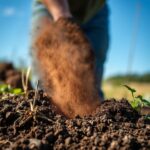How Long Will Homemade Compost Last? Exploring Longevity and Storage Tips for Optimal Use

Homemade compost is a valuable resource for any gardener, providing essential nutrients to enrich soil and promote plant health. However, understanding its longevity is crucial for maximizing benefits. Factors like the composting process, materials used, and storage conditions can significantly influence how long compost remains effective. In this article, we will explore the lifespan of homemade compost, shedding light on how to determine when it is ready for use and tips for optimal storage. By following best practices, you can ensure that your compost maintains its quality and nutrients for as long as possible, leading to thriving garden success.
How Long Will Homemade Compost Last?
Homemade compost can last anywhere from three months to two years, depending on various factors such as the materials used, the composting method, and environmental conditions. The decomposition process depends heavily on the balance of green (nitrogen-rich) and brown (carbon-rich) materials, as well as moisture and aeration levels. If the compost is maintained properly, it can reach a state where it is rich in nutrients and effective for improving soil health. However, as time progresses, the compost may begin to lose some of its effectiveness unless it is consistently turned and aerated to promote further breakdown.
Factors Influencing Compost Lifespan
The lifespan of homemade compost is influenced by several factors including the types of organic materials used, the size of compost piles, and local climate conditions. For instance, high-nitrogen materials such as vegetable scraps can decompose more quickly than carbon-heavy materials like dried leaves. Additionally, maintaining the right moisture level and ensuring proper aeration by turning the compost regularly can significantly speed up the decomposition process, leading to a shorter timeframe for the compost to become usable.
Signs Your Compost Is Ready
To determine if your homemade compost is ready for use, look for specific signs such as a dark, crumbly texture and an earthy smell. When the compost has broken down adequately, it should no longer resemble the original materials you put in; instead, it should look like rich soil. Furthermore, the temperature of the compost pile should decrease and stabilize, indicating that the active decomposition has completed and that it is safe to use in your garden.
Storage Tips for Long-Lasting Compost
If you have excess homemade compost and want to store it for an extended period, it’s essential to keep it in a dry, cool environment. Using a container or bin with good ventilation can help prevent moisture buildup, which can lead to compacting or spoilage. Regularly mixing the compost can also help maintain its freshness and avoid anaerobic conditions. If stored properly, compost can last for several months without a significant loss of its nutritional value.
See also:
Using Old Compost in Gardens
Using older compost in gardens can still provide benefits, even if it’s been stored for a while. The compost can improve soil structure, enhance moisture retention, and provide essential nutrients to plants. However, it is crucial to evaluate the compost before using it; if it appears overly dry or compacted, rehydrating and turning it can revitalize its effectiveness. Decomposed organic matter can also attract beneficial insects and microorganisms that contribute to a healthy garden ecosystem.
Comparing Homemade Compost with Store-Bought Options
Homemade compost is often seen as a more sustainable and nutrient-rich alternative to store-bought compost. While store-bought options can be convenient and consistent, homemade compost is usually fresher and tailored to specific garden needs, offering a greater variety of micronutrients. However, it is essential to note that the quality of homemade compost can vary greatly depending on the ingredients used and the composting process. Ultimately, the choice between homemade and store-bought should align with individual gardening goals and resource availability.
| Compost Type | Duration | Benefits |
|---|---|---|
| Homemade Compost | 3 months - 2 years | Nutrient-rich, sustainable |
| Store-Bought Compost | Varies | Convenient, consistent quality |
Understanding the Factors Affecting Homemade Compost Longevity
Homemade compost can last anywhere from three months to two years, depending on several critical factors such as composition, storage conditions, and moisture levels. The balance of carbon to nitrogen in your compost pile is vital; a mix that is too high in carbon may take longer to decompose, while a nitrogen-rich pile can break down more quickly but may require more monitoring for odor and moisture. Aeration and the size of the compost materials also play significant roles in the decomposition process. Properly stored in a cool, dry, and dark environment can extend the lifespan of the compost, ensuring it remains effective for when you're ready to use it in your garden.
Optimal Storage Conditions for Homemade Compost
The storage conditions for homemade compost significantly influence its longevity. Ideally, compost should be kept in a well-ventilated area that avoids direct sunlight and retains a moderate temperature. If compost is stored in plastic bins or metal containers, ensure they contain air holes to allow for proper aeration. Additionally, keep the compost pile or bin slightly moist, as excessive dryness can slow down decomposition, while too much moisture can lead to anaerobic conditions and unpleasant odors. Regular turning of the compost helps maintain a healthy environment that enhances its longevity.
Signs That Homemade Compost is Decomposed
Identifying when homemade compost is fully decomposed is crucial for successful use in gardening. Signs of maturity include a dark, crumbly texture and an earthy smell, indicating that the organic materials have broken down properly. The compost should no longer retain the original shapes of its ingredients, such as fruit peels or leaves, showing that they have been successfully transformed. If the compost still has visible pieces of material or emits a foul odor, it likely needs more time to decompose and may require attention to moisture and temperature levels.
See also:
The Role of Microorganisms in Compost Longevity
Microorganisms such as bacteria, fungi, and other decomposers play a critical role in enhancing the longevity of homemade compost. These microorganisms break down complex organic materials into simpler compounds, a process known as mineralization. The diversity of microorganisms present in your compost can affect the rate of decomposition; a rich microbial environment will enhance the compost's breakdown and nutrient availability. To ensure a thriving population of microorganisms, it is important to maintain adequate moisture levels and a balanced carbon-to-nitrogen ratio to provide them with the necessary conditions for effective decomposition.
How to Revive Old Compost for Extended Use
Reviving old compost can significantly increase its usability and lifespan. If your compost has remained unused for an extended period and has a compacted or stale appearance, aerating it can help restore its structure and activity. Mix in some fresh organic material alongside water to reintroduce moisture and nutrients. Additionally, adding a handful of fertilizer or compost activator may boost microbial activity, improving the decomposition process. Periodically turning the compost pile can also help revive the microbial community, ensuring that it becomes a valuable resource for your garden once again.
Best Uses for Aged Homemade Compost
Aged homemade compost serves a variety of beneficial purposes in gardening and landscaping. It can be used as a soil amendment to enrich garden beds, improving soil structure, moisture retention, and nutrient availability. Additionally, aged compost can be applied as a top dressing for established plants, providing a slow-release source of nutrients. It can also be included in potting mixes for container gardening or used to create compost tea, a nutrient-rich liquid that can be applied as a foliar spray or soil drench. Its versatility makes aged compost an essential resource for promoting healthy plant growth and enhancing soil fertility.
Questions from Our Readers
How long will homemade compost last?
The lifespan of homemade compost can vary, but it generally lasts between 6 months to 2 years. This depends on factors like the ingredients used, the composting method, and how frequently it's turned. Over time, compost will break down fully, enriching the soil and providing vital nutrients for your plants.
How can I tell if my homemade compost is ready?
Homemade compost is ready when it appears dark, crumbly, and has a pleasant earthy smell. The original ingredients should no longer be recognizable, indicating that the decomposition process is complete. Monitoring temperature changes and moisture levels can also help in determining readiness.
See also:
Can I store homemade compost for a long time?
Yes, you can store homemade compost for an extended period, but it is best used within 1-2 years for optimal effectiveness. Over time, stored compost may lose some of its nutrient value, so ensure it is kept in a cool, dry place to maintain its quality as much as possible.
What is the best way to use homemade compost?
The best way to use homemade compost is to incorporate it into your garden soil or use it as a top dressing for established plants. Mix it with existing soil to improve texture, drainage, and fertility. Alternatively, you can create compost tea by steeping compost in water for liquid fertilization.

If you want to read more articles like How Long Will Homemade Compost Last? Exploring Longevity and Storage Tips for Optimal Use, we recommend you check out our Compost category.
Leave a Reply
Related Articles